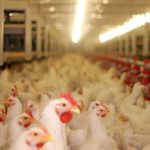
News

Managing microbes
Taking a page from pulse production, beneficial soil microbes are under the microscope

No end in sight for supply management working groups
The slow pace of progress is due to the complexity of the issues at hand, say industry insiders

Recent KAP AGM explored policy landscape
From tax breaks to help young farmers rent land to wild boar the discussion was wide ranging
KAP wants drainage regs changed to encourage on-farm storage
One farmer says he is successfully using excess water to irrigate crops instead of pushing downstream on others

Grain by rail fails to keep up
Rail transportation is the biggest bottleneck in the grain-handling system

The farmers’ market goes high tech
A small group of local food producers are taking their marketing efforts online

Rollout of mental health programs for rural Canadians coming this year
4-H, Farm Management Canada and Farm Credit are working together to try to raise awareness of this issue

Hunting permission slips pitched
Producers say they’re sick of dealing with trespassers during hunting season and hope written permission rules might help them cope

Harvesting wild genes boosts resistance
A new method promises to make finding and using these genes much easier and faster

Government fixes farm safety funding
The Manitoba Farm Safety Program: It’s free, confidential and funded for at least another five years


